BUS 310: Governance, Law and Ethics Assignment: Contract and Tort Law
VerifiedAdded on 2022/11/26
|9
|3764
|171
Report
AI Summary
This report provides a comprehensive overview of contract law, tort law, and consumer law within the New Zealand legal framework, focusing on the Commercial and Contract Law Act 2017, the Fair Trading Act 1986, and the Consumer Guarantees Act (CGA) 1993. It examines the essential elements of a contract, including offer, acceptance, consideration, intention, certainty, and capacity, using a case study involving a contract between ABC company and John Smith to illustrate these concepts. The report identifies potential deficiencies in the contract and suggests remedies. Furthermore, it delves into the law of tort, specifically negligence, and the Consumer Guarantees Act, highlighting key provisions and their implications for businesses and consumers. The analysis includes discussions on misleading conduct, false representations, and the importance of providing accurate information to consumers. The report emphasizes the application of these laws to real-world scenarios, providing a practical understanding of the legal landscape in New Zealand.

GOVERNANCE LAW AND ETHICS 1
Governance Law and Ethics
Governance Law and Ethics
Paraphrase This Document
Need a fresh take? Get an instant paraphrase of this document with our AI Paraphraser
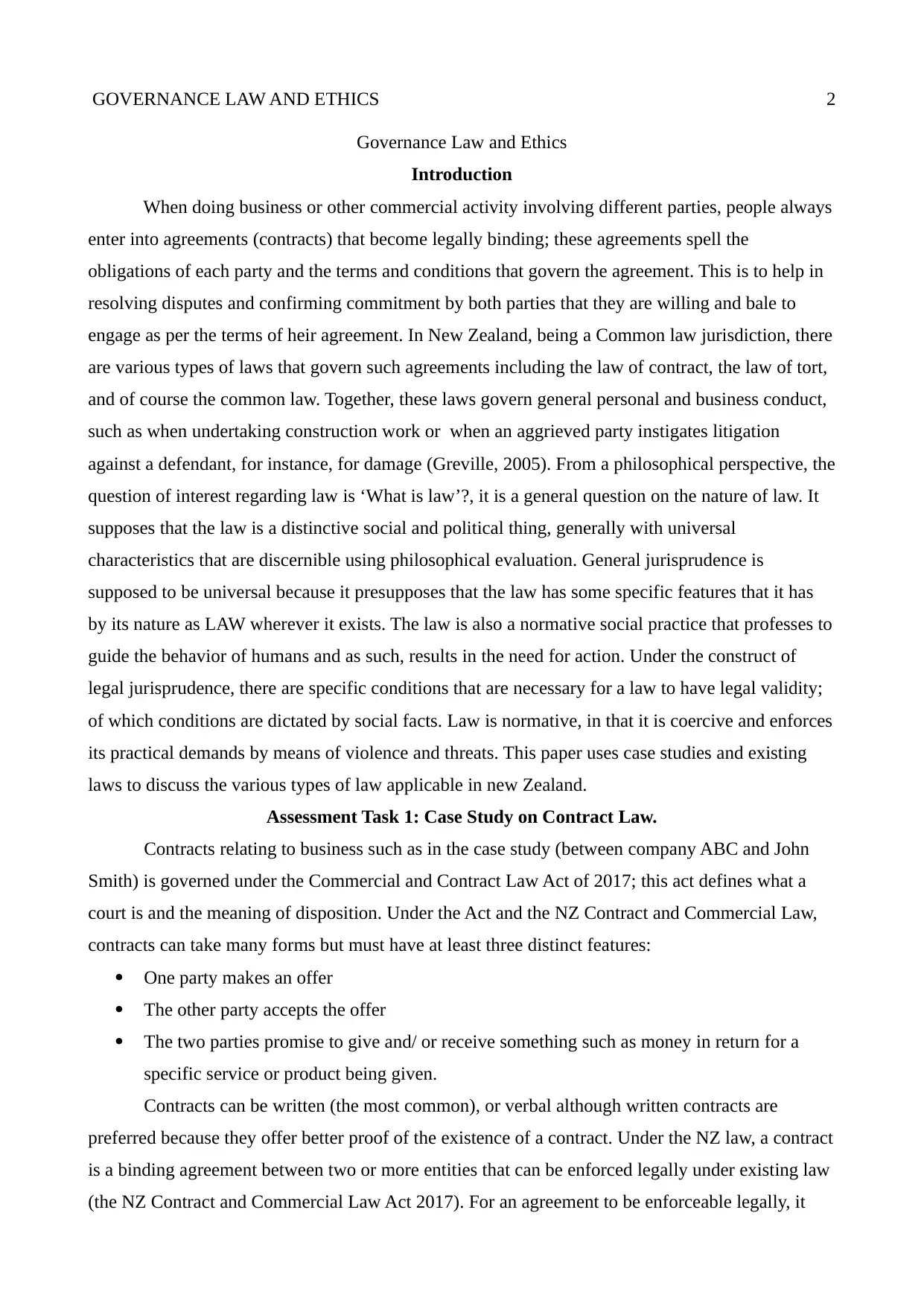
GOVERNANCE LAW AND ETHICS 2
Governance Law and Ethics
Introduction
When doing business or other commercial activity involving different parties, people always
enter into agreements (contracts) that become legally binding; these agreements spell the
obligations of each party and the terms and conditions that govern the agreement. This is to help in
resolving disputes and confirming commitment by both parties that they are willing and bale to
engage as per the terms of heir agreement. In New Zealand, being a Common law jurisdiction, there
are various types of laws that govern such agreements including the law of contract, the law of tort,
and of course the common law. Together, these laws govern general personal and business conduct,
such as when undertaking construction work or when an aggrieved party instigates litigation
against a defendant, for instance, for damage (Greville, 2005). From a philosophical perspective, the
question of interest regarding law is ‘What is law’?, it is a general question on the nature of law. It
supposes that the law is a distinctive social and political thing, generally with universal
characteristics that are discernible using philosophical evaluation. General jurisprudence is
supposed to be universal because it presupposes that the law has some specific features that it has
by its nature as LAW wherever it exists. The law is also a normative social practice that professes to
guide the behavior of humans and as such, results in the need for action. Under the construct of
legal jurisprudence, there are specific conditions that are necessary for a law to have legal validity;
of which conditions are dictated by social facts. Law is normative, in that it is coercive and enforces
its practical demands by means of violence and threats. This paper uses case studies and existing
laws to discuss the various types of law applicable in new Zealand.
Assessment Task 1: Case Study on Contract Law.
Contracts relating to business such as in the case study (between company ABC and John
Smith) is governed under the Commercial and Contract Law Act of 2017; this act defines what a
court is and the meaning of disposition. Under the Act and the NZ Contract and Commercial Law,
contracts can take many forms but must have at least three distinct features:
One party makes an offer
The other party accepts the offer
The two parties promise to give and/ or receive something such as money in return for a
specific service or product being given.
Contracts can be written (the most common), or verbal although written contracts are
preferred because they offer better proof of the existence of a contract. Under the NZ law, a contract
is a binding agreement between two or more entities that can be enforced legally under existing law
(the NZ Contract and Commercial Law Act 2017). For an agreement to be enforceable legally, it
Governance Law and Ethics
Introduction
When doing business or other commercial activity involving different parties, people always
enter into agreements (contracts) that become legally binding; these agreements spell the
obligations of each party and the terms and conditions that govern the agreement. This is to help in
resolving disputes and confirming commitment by both parties that they are willing and bale to
engage as per the terms of heir agreement. In New Zealand, being a Common law jurisdiction, there
are various types of laws that govern such agreements including the law of contract, the law of tort,
and of course the common law. Together, these laws govern general personal and business conduct,
such as when undertaking construction work or when an aggrieved party instigates litigation
against a defendant, for instance, for damage (Greville, 2005). From a philosophical perspective, the
question of interest regarding law is ‘What is law’?, it is a general question on the nature of law. It
supposes that the law is a distinctive social and political thing, generally with universal
characteristics that are discernible using philosophical evaluation. General jurisprudence is
supposed to be universal because it presupposes that the law has some specific features that it has
by its nature as LAW wherever it exists. The law is also a normative social practice that professes to
guide the behavior of humans and as such, results in the need for action. Under the construct of
legal jurisprudence, there are specific conditions that are necessary for a law to have legal validity;
of which conditions are dictated by social facts. Law is normative, in that it is coercive and enforces
its practical demands by means of violence and threats. This paper uses case studies and existing
laws to discuss the various types of law applicable in new Zealand.
Assessment Task 1: Case Study on Contract Law.
Contracts relating to business such as in the case study (between company ABC and John
Smith) is governed under the Commercial and Contract Law Act of 2017; this act defines what a
court is and the meaning of disposition. Under the Act and the NZ Contract and Commercial Law,
contracts can take many forms but must have at least three distinct features:
One party makes an offer
The other party accepts the offer
The two parties promise to give and/ or receive something such as money in return for a
specific service or product being given.
Contracts can be written (the most common), or verbal although written contracts are
preferred because they offer better proof of the existence of a contract. Under the NZ law, a contract
is a binding agreement between two or more entities that can be enforced legally under existing law
(the NZ Contract and Commercial Law Act 2017). For an agreement to be enforceable legally, it
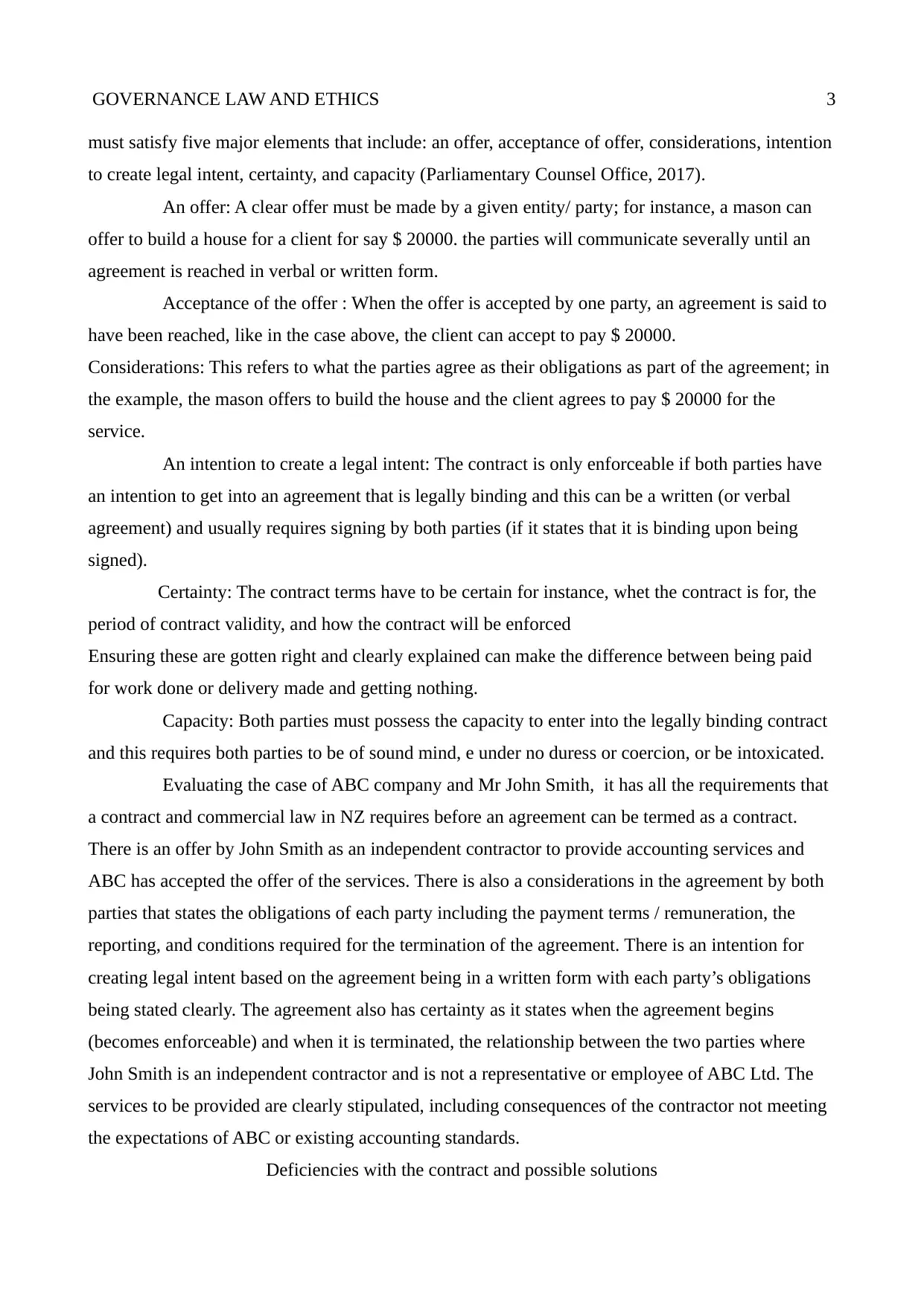
GOVERNANCE LAW AND ETHICS 3
must satisfy five major elements that include: an offer, acceptance of offer, considerations, intention
to create legal intent, certainty, and capacity (Parliamentary Counsel Office, 2017).
An offer: A clear offer must be made by a given entity/ party; for instance, a mason can
offer to build a house for a client for say $ 20000. the parties will communicate severally until an
agreement is reached in verbal or written form.
Acceptance of the offer : When the offer is accepted by one party, an agreement is said to
have been reached, like in the case above, the client can accept to pay $ 20000.
Considerations: This refers to what the parties agree as their obligations as part of the agreement; in
the example, the mason offers to build the house and the client agrees to pay $ 20000 for the
service.
An intention to create a legal intent: The contract is only enforceable if both parties have
an intention to get into an agreement that is legally binding and this can be a written (or verbal
agreement) and usually requires signing by both parties (if it states that it is binding upon being
signed).
Certainty: The contract terms have to be certain for instance, whet the contract is for, the
period of contract validity, and how the contract will be enforced
Ensuring these are gotten right and clearly explained can make the difference between being paid
for work done or delivery made and getting nothing.
Capacity: Both parties must possess the capacity to enter into the legally binding contract
and this requires both parties to be of sound mind, e under no duress or coercion, or be intoxicated.
Evaluating the case of ABC company and Mr John Smith, it has all the requirements that
a contract and commercial law in NZ requires before an agreement can be termed as a contract.
There is an offer by John Smith as an independent contractor to provide accounting services and
ABC has accepted the offer of the services. There is also a considerations in the agreement by both
parties that states the obligations of each party including the payment terms / remuneration, the
reporting, and conditions required for the termination of the agreement. There is an intention for
creating legal intent based on the agreement being in a written form with each party’s obligations
being stated clearly. The agreement also has certainty as it states when the agreement begins
(becomes enforceable) and when it is terminated, the relationship between the two parties where
John Smith is an independent contractor and is not a representative or employee of ABC Ltd. The
services to be provided are clearly stipulated, including consequences of the contractor not meeting
the expectations of ABC or existing accounting standards.
Deficiencies with the contract and possible solutions
must satisfy five major elements that include: an offer, acceptance of offer, considerations, intention
to create legal intent, certainty, and capacity (Parliamentary Counsel Office, 2017).
An offer: A clear offer must be made by a given entity/ party; for instance, a mason can
offer to build a house for a client for say $ 20000. the parties will communicate severally until an
agreement is reached in verbal or written form.
Acceptance of the offer : When the offer is accepted by one party, an agreement is said to
have been reached, like in the case above, the client can accept to pay $ 20000.
Considerations: This refers to what the parties agree as their obligations as part of the agreement; in
the example, the mason offers to build the house and the client agrees to pay $ 20000 for the
service.
An intention to create a legal intent: The contract is only enforceable if both parties have
an intention to get into an agreement that is legally binding and this can be a written (or verbal
agreement) and usually requires signing by both parties (if it states that it is binding upon being
signed).
Certainty: The contract terms have to be certain for instance, whet the contract is for, the
period of contract validity, and how the contract will be enforced
Ensuring these are gotten right and clearly explained can make the difference between being paid
for work done or delivery made and getting nothing.
Capacity: Both parties must possess the capacity to enter into the legally binding contract
and this requires both parties to be of sound mind, e under no duress or coercion, or be intoxicated.
Evaluating the case of ABC company and Mr John Smith, it has all the requirements that
a contract and commercial law in NZ requires before an agreement can be termed as a contract.
There is an offer by John Smith as an independent contractor to provide accounting services and
ABC has accepted the offer of the services. There is also a considerations in the agreement by both
parties that states the obligations of each party including the payment terms / remuneration, the
reporting, and conditions required for the termination of the agreement. There is an intention for
creating legal intent based on the agreement being in a written form with each party’s obligations
being stated clearly. The agreement also has certainty as it states when the agreement begins
(becomes enforceable) and when it is terminated, the relationship between the two parties where
John Smith is an independent contractor and is not a representative or employee of ABC Ltd. The
services to be provided are clearly stipulated, including consequences of the contractor not meeting
the expectations of ABC or existing accounting standards.
Deficiencies with the contract and possible solutions
⊘ This is a preview!⊘
Do you want full access?
Subscribe today to unlock all pages.

Trusted by 1+ million students worldwide
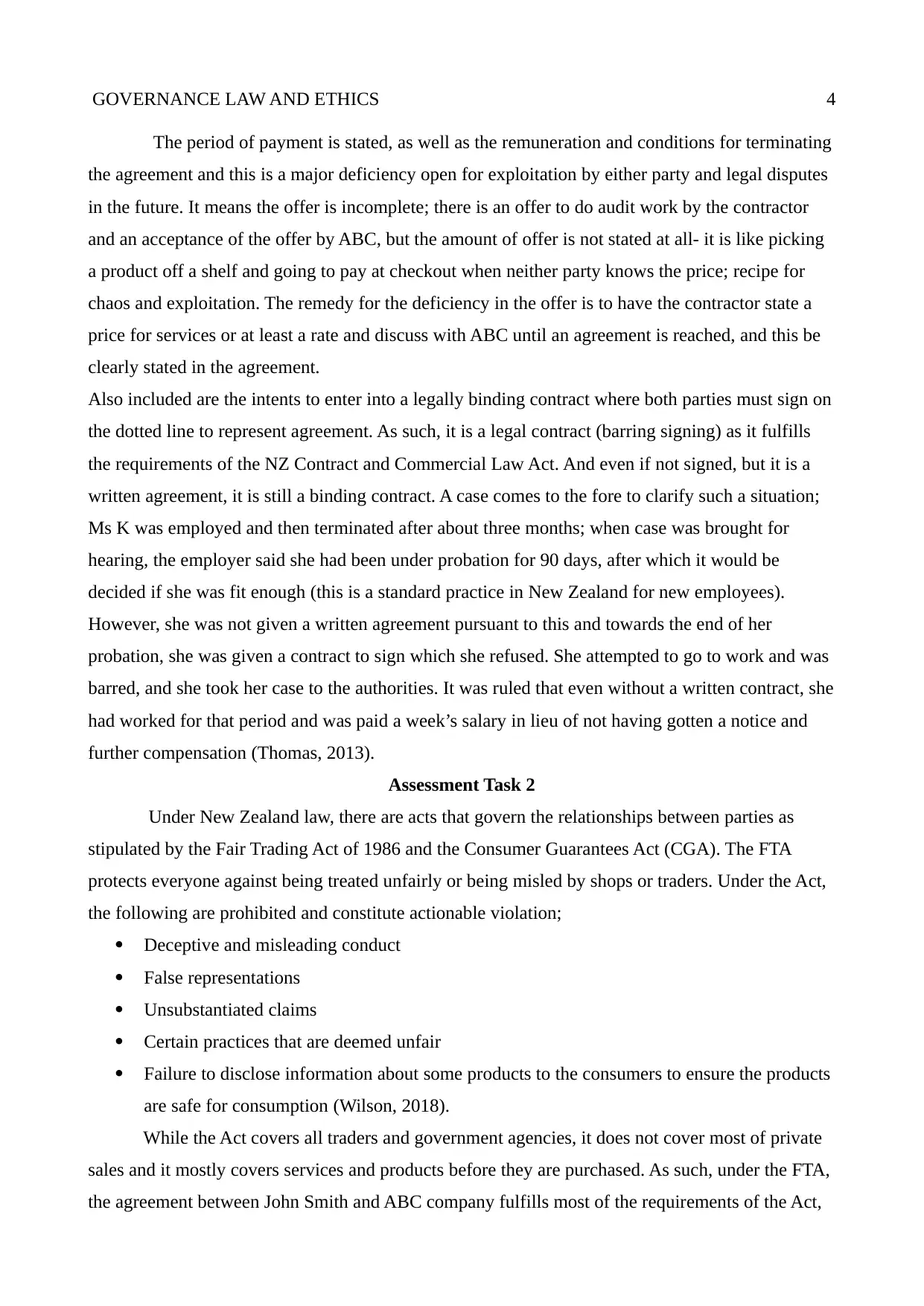
GOVERNANCE LAW AND ETHICS 4
The period of payment is stated, as well as the remuneration and conditions for terminating
the agreement and this is a major deficiency open for exploitation by either party and legal disputes
in the future. It means the offer is incomplete; there is an offer to do audit work by the contractor
and an acceptance of the offer by ABC, but the amount of offer is not stated at all- it is like picking
a product off a shelf and going to pay at checkout when neither party knows the price; recipe for
chaos and exploitation. The remedy for the deficiency in the offer is to have the contractor state a
price for services or at least a rate and discuss with ABC until an agreement is reached, and this be
clearly stated in the agreement.
Also included are the intents to enter into a legally binding contract where both parties must sign on
the dotted line to represent agreement. As such, it is a legal contract (barring signing) as it fulfills
the requirements of the NZ Contract and Commercial Law Act. And even if not signed, but it is a
written agreement, it is still a binding contract. A case comes to the fore to clarify such a situation;
Ms K was employed and then terminated after about three months; when case was brought for
hearing, the employer said she had been under probation for 90 days, after which it would be
decided if she was fit enough (this is a standard practice in New Zealand for new employees).
However, she was not given a written agreement pursuant to this and towards the end of her
probation, she was given a contract to sign which she refused. She attempted to go to work and was
barred, and she took her case to the authorities. It was ruled that even without a written contract, she
had worked for that period and was paid a week’s salary in lieu of not having gotten a notice and
further compensation (Thomas, 2013).
Assessment Task 2
Under New Zealand law, there are acts that govern the relationships between parties as
stipulated by the Fair Trading Act of 1986 and the Consumer Guarantees Act (CGA). The FTA
protects everyone against being treated unfairly or being misled by shops or traders. Under the Act,
the following are prohibited and constitute actionable violation;
Deceptive and misleading conduct
False representations
Unsubstantiated claims
Certain practices that are deemed unfair
Failure to disclose information about some products to the consumers to ensure the products
are safe for consumption (Wilson, 2018).
While the Act covers all traders and government agencies, it does not cover most of private
sales and it mostly covers services and products before they are purchased. As such, under the FTA,
the agreement between John Smith and ABC company fulfills most of the requirements of the Act,
The period of payment is stated, as well as the remuneration and conditions for terminating
the agreement and this is a major deficiency open for exploitation by either party and legal disputes
in the future. It means the offer is incomplete; there is an offer to do audit work by the contractor
and an acceptance of the offer by ABC, but the amount of offer is not stated at all- it is like picking
a product off a shelf and going to pay at checkout when neither party knows the price; recipe for
chaos and exploitation. The remedy for the deficiency in the offer is to have the contractor state a
price for services or at least a rate and discuss with ABC until an agreement is reached, and this be
clearly stated in the agreement.
Also included are the intents to enter into a legally binding contract where both parties must sign on
the dotted line to represent agreement. As such, it is a legal contract (barring signing) as it fulfills
the requirements of the NZ Contract and Commercial Law Act. And even if not signed, but it is a
written agreement, it is still a binding contract. A case comes to the fore to clarify such a situation;
Ms K was employed and then terminated after about three months; when case was brought for
hearing, the employer said she had been under probation for 90 days, after which it would be
decided if she was fit enough (this is a standard practice in New Zealand for new employees).
However, she was not given a written agreement pursuant to this and towards the end of her
probation, she was given a contract to sign which she refused. She attempted to go to work and was
barred, and she took her case to the authorities. It was ruled that even without a written contract, she
had worked for that period and was paid a week’s salary in lieu of not having gotten a notice and
further compensation (Thomas, 2013).
Assessment Task 2
Under New Zealand law, there are acts that govern the relationships between parties as
stipulated by the Fair Trading Act of 1986 and the Consumer Guarantees Act (CGA). The FTA
protects everyone against being treated unfairly or being misled by shops or traders. Under the Act,
the following are prohibited and constitute actionable violation;
Deceptive and misleading conduct
False representations
Unsubstantiated claims
Certain practices that are deemed unfair
Failure to disclose information about some products to the consumers to ensure the products
are safe for consumption (Wilson, 2018).
While the Act covers all traders and government agencies, it does not cover most of private
sales and it mostly covers services and products before they are purchased. As such, under the FTA,
the agreement between John Smith and ABC company fulfills most of the requirements of the Act,
Paraphrase This Document
Need a fresh take? Get an instant paraphrase of this document with our AI Paraphraser
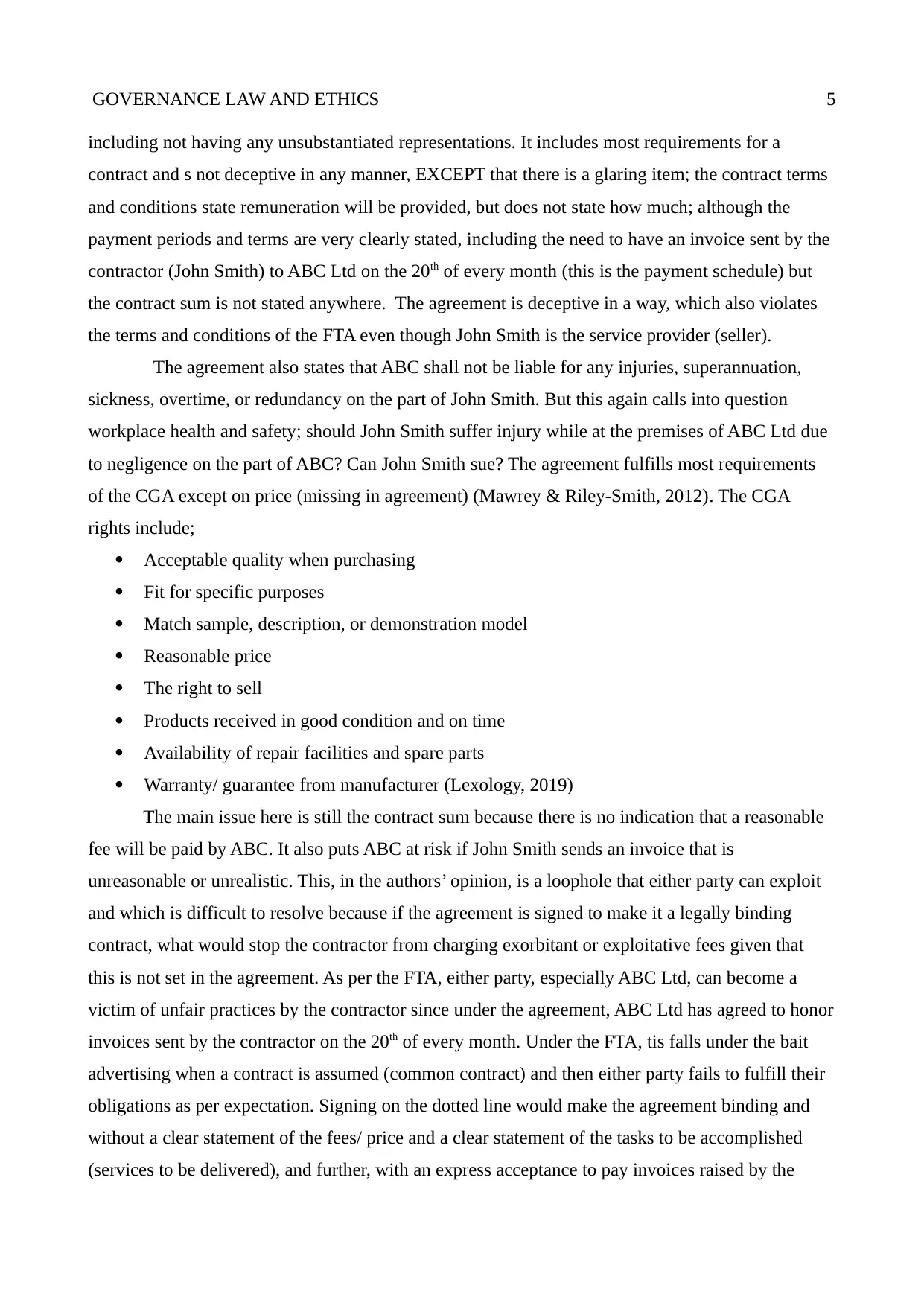
GOVERNANCE LAW AND ETHICS 5
including not having any unsubstantiated representations. It includes most requirements for a
contract and s not deceptive in any manner, EXCEPT that there is a glaring item; the contract terms
and conditions state remuneration will be provided, but does not state how much; although the
payment periods and terms are very clearly stated, including the need to have an invoice sent by the
contractor (John Smith) to ABC Ltd on the 20th of every month (this is the payment schedule) but
the contract sum is not stated anywhere. The agreement is deceptive in a way, which also violates
the terms and conditions of the FTA even though John Smith is the service provider (seller).
The agreement also states that ABC shall not be liable for any injuries, superannuation,
sickness, overtime, or redundancy on the part of John Smith. But this again calls into question
workplace health and safety; should John Smith suffer injury while at the premises of ABC Ltd due
to negligence on the part of ABC? Can John Smith sue? The agreement fulfills most requirements
of the CGA except on price (missing in agreement) (Mawrey & Riley-Smith, 2012). The CGA
rights include;
Acceptable quality when purchasing
Fit for specific purposes
Match sample, description, or demonstration model
Reasonable price
The right to sell
Products received in good condition and on time
Availability of repair facilities and spare parts
Warranty/ guarantee from manufacturer (Lexology, 2019)
The main issue here is still the contract sum because there is no indication that a reasonable
fee will be paid by ABC. It also puts ABC at risk if John Smith sends an invoice that is
unreasonable or unrealistic. This, in the authors’ opinion, is a loophole that either party can exploit
and which is difficult to resolve because if the agreement is signed to make it a legally binding
contract, what would stop the contractor from charging exorbitant or exploitative fees given that
this is not set in the agreement. As per the FTA, either party, especially ABC Ltd, can become a
victim of unfair practices by the contractor since under the agreement, ABC Ltd has agreed to honor
invoices sent by the contractor on the 20th of every month. Under the FTA, tis falls under the bait
advertising when a contract is assumed (common contract) and then either party fails to fulfill their
obligations as per expectation. Signing on the dotted line would make the agreement binding and
without a clear statement of the fees/ price and a clear statement of the tasks to be accomplished
(services to be delivered), and further, with an express acceptance to pay invoices raised by the
including not having any unsubstantiated representations. It includes most requirements for a
contract and s not deceptive in any manner, EXCEPT that there is a glaring item; the contract terms
and conditions state remuneration will be provided, but does not state how much; although the
payment periods and terms are very clearly stated, including the need to have an invoice sent by the
contractor (John Smith) to ABC Ltd on the 20th of every month (this is the payment schedule) but
the contract sum is not stated anywhere. The agreement is deceptive in a way, which also violates
the terms and conditions of the FTA even though John Smith is the service provider (seller).
The agreement also states that ABC shall not be liable for any injuries, superannuation,
sickness, overtime, or redundancy on the part of John Smith. But this again calls into question
workplace health and safety; should John Smith suffer injury while at the premises of ABC Ltd due
to negligence on the part of ABC? Can John Smith sue? The agreement fulfills most requirements
of the CGA except on price (missing in agreement) (Mawrey & Riley-Smith, 2012). The CGA
rights include;
Acceptable quality when purchasing
Fit for specific purposes
Match sample, description, or demonstration model
Reasonable price
The right to sell
Products received in good condition and on time
Availability of repair facilities and spare parts
Warranty/ guarantee from manufacturer (Lexology, 2019)
The main issue here is still the contract sum because there is no indication that a reasonable
fee will be paid by ABC. It also puts ABC at risk if John Smith sends an invoice that is
unreasonable or unrealistic. This, in the authors’ opinion, is a loophole that either party can exploit
and which is difficult to resolve because if the agreement is signed to make it a legally binding
contract, what would stop the contractor from charging exorbitant or exploitative fees given that
this is not set in the agreement. As per the FTA, either party, especially ABC Ltd, can become a
victim of unfair practices by the contractor since under the agreement, ABC Ltd has agreed to honor
invoices sent by the contractor on the 20th of every month. Under the FTA, tis falls under the bait
advertising when a contract is assumed (common contract) and then either party fails to fulfill their
obligations as per expectation. Signing on the dotted line would make the agreement binding and
without a clear statement of the fees/ price and a clear statement of the tasks to be accomplished
(services to be delivered), and further, with an express acceptance to pay invoices raised by the
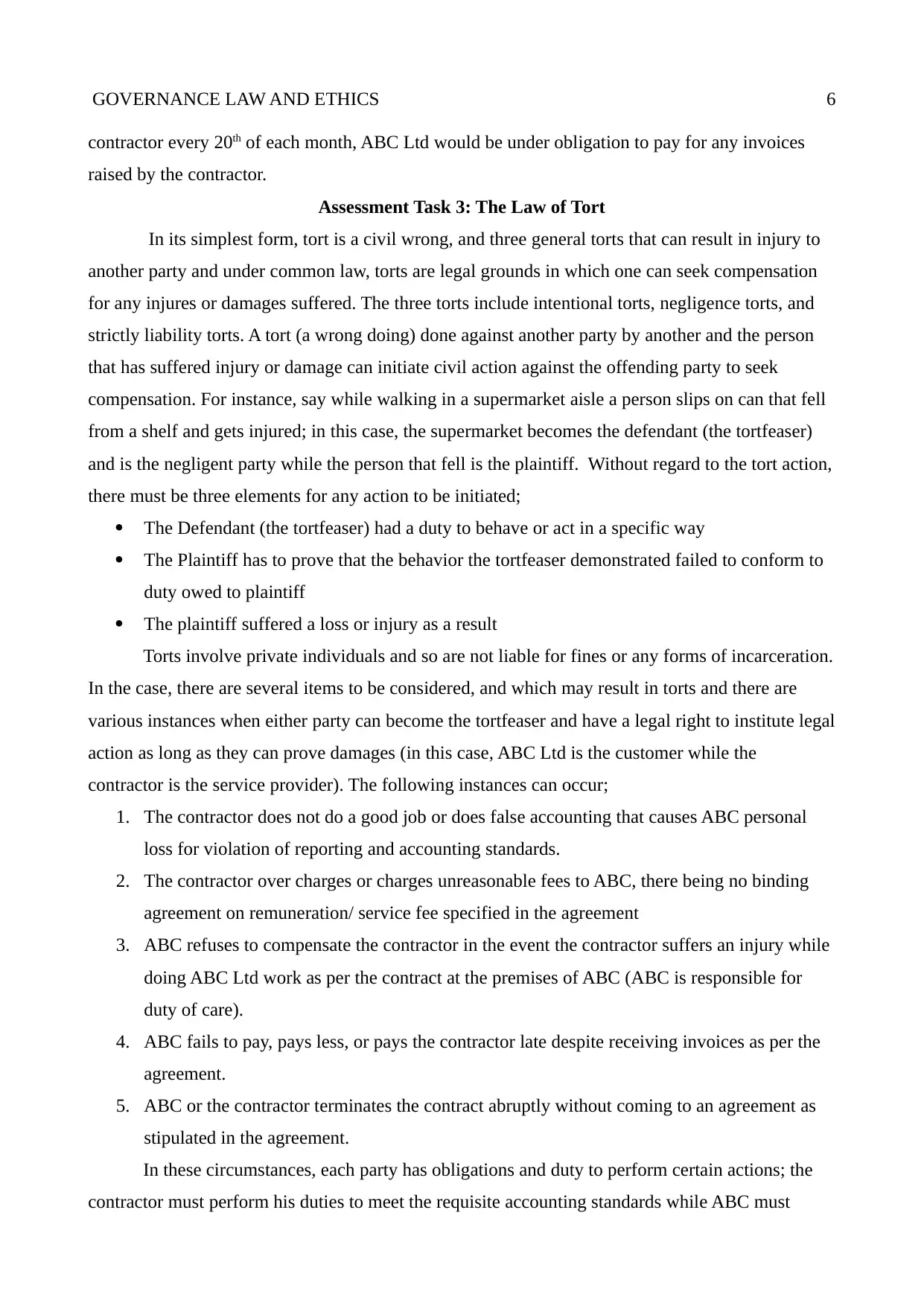
GOVERNANCE LAW AND ETHICS 6
contractor every 20th of each month, ABC Ltd would be under obligation to pay for any invoices
raised by the contractor.
Assessment Task 3: The Law of Tort
In its simplest form, tort is a civil wrong, and three general torts that can result in injury to
another party and under common law, torts are legal grounds in which one can seek compensation
for any injures or damages suffered. The three torts include intentional torts, negligence torts, and
strictly liability torts. A tort (a wrong doing) done against another party by another and the person
that has suffered injury or damage can initiate civil action against the offending party to seek
compensation. For instance, say while walking in a supermarket aisle a person slips on can that fell
from a shelf and gets injured; in this case, the supermarket becomes the defendant (the tortfeaser)
and is the negligent party while the person that fell is the plaintiff. Without regard to the tort action,
there must be three elements for any action to be initiated;
The Defendant (the tortfeaser) had a duty to behave or act in a specific way
The Plaintiff has to prove that the behavior the tortfeaser demonstrated failed to conform to
duty owed to plaintiff
The plaintiff suffered a loss or injury as a result
Torts involve private individuals and so are not liable for fines or any forms of incarceration.
In the case, there are several items to be considered, and which may result in torts and there are
various instances when either party can become the tortfeaser and have a legal right to institute legal
action as long as they can prove damages (in this case, ABC Ltd is the customer while the
contractor is the service provider). The following instances can occur;
1. The contractor does not do a good job or does false accounting that causes ABC personal
loss for violation of reporting and accounting standards.
2. The contractor over charges or charges unreasonable fees to ABC, there being no binding
agreement on remuneration/ service fee specified in the agreement
3. ABC refuses to compensate the contractor in the event the contractor suffers an injury while
doing ABC Ltd work as per the contract at the premises of ABC (ABC is responsible for
duty of care).
4. ABC fails to pay, pays less, or pays the contractor late despite receiving invoices as per the
agreement.
5. ABC or the contractor terminates the contract abruptly without coming to an agreement as
stipulated in the agreement.
In these circumstances, each party has obligations and duty to perform certain actions; the
contractor must perform his duties to meet the requisite accounting standards while ABC must
contractor every 20th of each month, ABC Ltd would be under obligation to pay for any invoices
raised by the contractor.
Assessment Task 3: The Law of Tort
In its simplest form, tort is a civil wrong, and three general torts that can result in injury to
another party and under common law, torts are legal grounds in which one can seek compensation
for any injures or damages suffered. The three torts include intentional torts, negligence torts, and
strictly liability torts. A tort (a wrong doing) done against another party by another and the person
that has suffered injury or damage can initiate civil action against the offending party to seek
compensation. For instance, say while walking in a supermarket aisle a person slips on can that fell
from a shelf and gets injured; in this case, the supermarket becomes the defendant (the tortfeaser)
and is the negligent party while the person that fell is the plaintiff. Without regard to the tort action,
there must be three elements for any action to be initiated;
The Defendant (the tortfeaser) had a duty to behave or act in a specific way
The Plaintiff has to prove that the behavior the tortfeaser demonstrated failed to conform to
duty owed to plaintiff
The plaintiff suffered a loss or injury as a result
Torts involve private individuals and so are not liable for fines or any forms of incarceration.
In the case, there are several items to be considered, and which may result in torts and there are
various instances when either party can become the tortfeaser and have a legal right to institute legal
action as long as they can prove damages (in this case, ABC Ltd is the customer while the
contractor is the service provider). The following instances can occur;
1. The contractor does not do a good job or does false accounting that causes ABC personal
loss for violation of reporting and accounting standards.
2. The contractor over charges or charges unreasonable fees to ABC, there being no binding
agreement on remuneration/ service fee specified in the agreement
3. ABC refuses to compensate the contractor in the event the contractor suffers an injury while
doing ABC Ltd work as per the contract at the premises of ABC (ABC is responsible for
duty of care).
4. ABC fails to pay, pays less, or pays the contractor late despite receiving invoices as per the
agreement.
5. ABC or the contractor terminates the contract abruptly without coming to an agreement as
stipulated in the agreement.
In these circumstances, each party has obligations and duty to perform certain actions; the
contractor must perform his duties to meet the requisite accounting standards while ABC must
⊘ This is a preview!⊘
Do you want full access?
Subscribe today to unlock all pages.

Trusted by 1+ million students worldwide
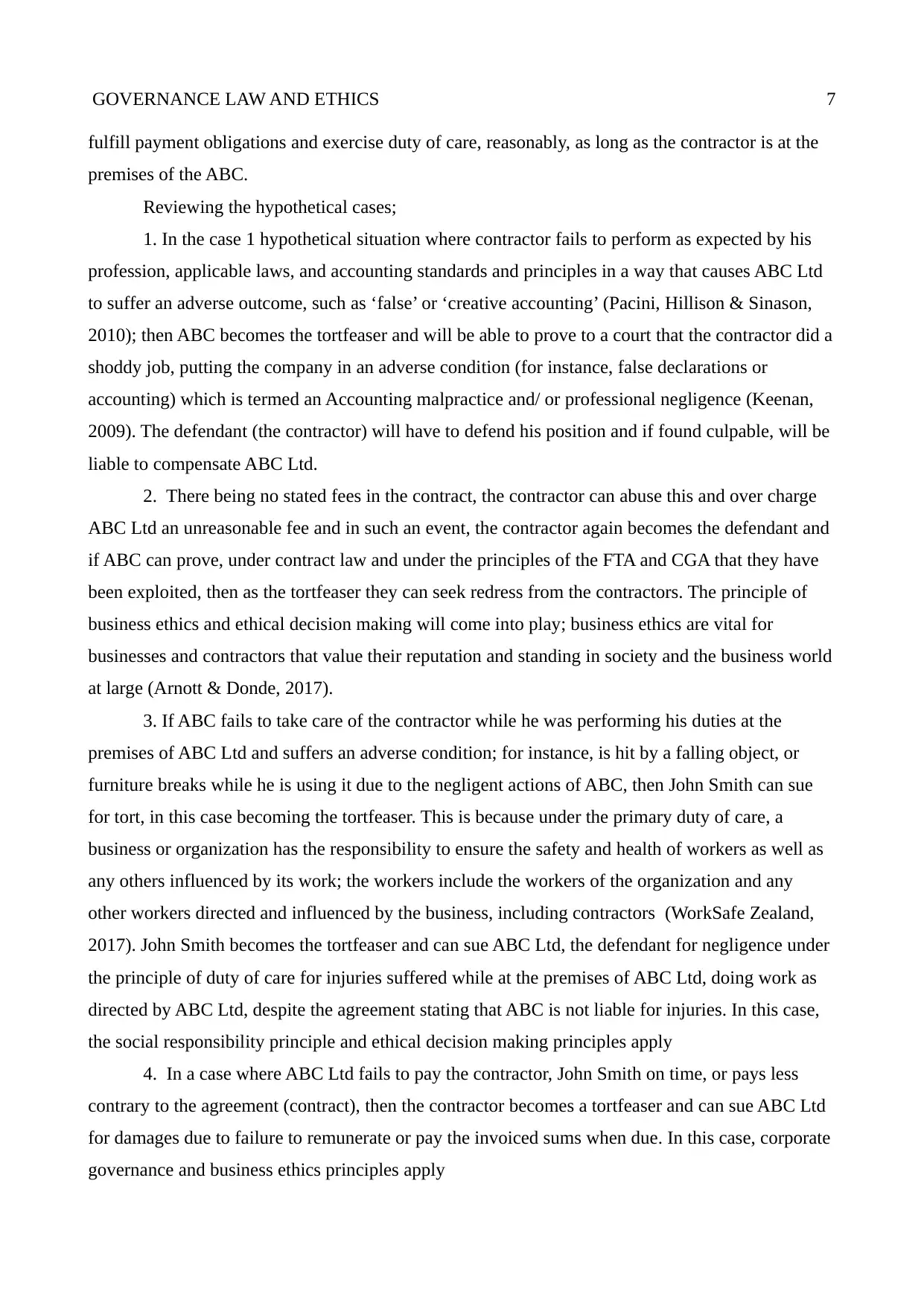
GOVERNANCE LAW AND ETHICS 7
fulfill payment obligations and exercise duty of care, reasonably, as long as the contractor is at the
premises of the ABC.
Reviewing the hypothetical cases;
1. In the case 1 hypothetical situation where contractor fails to perform as expected by his
profession, applicable laws, and accounting standards and principles in a way that causes ABC Ltd
to suffer an adverse outcome, such as ‘false’ or ‘creative accounting’ (Pacini, Hillison & Sinason,
2010); then ABC becomes the tortfeaser and will be able to prove to a court that the contractor did a
shoddy job, putting the company in an adverse condition (for instance, false declarations or
accounting) which is termed an Accounting malpractice and/ or professional negligence (Keenan,
2009). The defendant (the contractor) will have to defend his position and if found culpable, will be
liable to compensate ABC Ltd.
2. There being no stated fees in the contract, the contractor can abuse this and over charge
ABC Ltd an unreasonable fee and in such an event, the contractor again becomes the defendant and
if ABC can prove, under contract law and under the principles of the FTA and CGA that they have
been exploited, then as the tortfeaser they can seek redress from the contractors. The principle of
business ethics and ethical decision making will come into play; business ethics are vital for
businesses and contractors that value their reputation and standing in society and the business world
at large (Arnott & Donde, 2017).
3. If ABC fails to take care of the contractor while he was performing his duties at the
premises of ABC Ltd and suffers an adverse condition; for instance, is hit by a falling object, or
furniture breaks while he is using it due to the negligent actions of ABC, then John Smith can sue
for tort, in this case becoming the tortfeaser. This is because under the primary duty of care, a
business or organization has the responsibility to ensure the safety and health of workers as well as
any others influenced by its work; the workers include the workers of the organization and any
other workers directed and influenced by the business, including contractors (WorkSafe Zealand,
2017). John Smith becomes the tortfeaser and can sue ABC Ltd, the defendant for negligence under
the principle of duty of care for injuries suffered while at the premises of ABC Ltd, doing work as
directed by ABC Ltd, despite the agreement stating that ABC is not liable for injuries. In this case,
the social responsibility principle and ethical decision making principles apply
4. In a case where ABC Ltd fails to pay the contractor, John Smith on time, or pays less
contrary to the agreement (contract), then the contractor becomes a tortfeaser and can sue ABC Ltd
for damages due to failure to remunerate or pay the invoiced sums when due. In this case, corporate
governance and business ethics principles apply
fulfill payment obligations and exercise duty of care, reasonably, as long as the contractor is at the
premises of the ABC.
Reviewing the hypothetical cases;
1. In the case 1 hypothetical situation where contractor fails to perform as expected by his
profession, applicable laws, and accounting standards and principles in a way that causes ABC Ltd
to suffer an adverse outcome, such as ‘false’ or ‘creative accounting’ (Pacini, Hillison & Sinason,
2010); then ABC becomes the tortfeaser and will be able to prove to a court that the contractor did a
shoddy job, putting the company in an adverse condition (for instance, false declarations or
accounting) which is termed an Accounting malpractice and/ or professional negligence (Keenan,
2009). The defendant (the contractor) will have to defend his position and if found culpable, will be
liable to compensate ABC Ltd.
2. There being no stated fees in the contract, the contractor can abuse this and over charge
ABC Ltd an unreasonable fee and in such an event, the contractor again becomes the defendant and
if ABC can prove, under contract law and under the principles of the FTA and CGA that they have
been exploited, then as the tortfeaser they can seek redress from the contractors. The principle of
business ethics and ethical decision making will come into play; business ethics are vital for
businesses and contractors that value their reputation and standing in society and the business world
at large (Arnott & Donde, 2017).
3. If ABC fails to take care of the contractor while he was performing his duties at the
premises of ABC Ltd and suffers an adverse condition; for instance, is hit by a falling object, or
furniture breaks while he is using it due to the negligent actions of ABC, then John Smith can sue
for tort, in this case becoming the tortfeaser. This is because under the primary duty of care, a
business or organization has the responsibility to ensure the safety and health of workers as well as
any others influenced by its work; the workers include the workers of the organization and any
other workers directed and influenced by the business, including contractors (WorkSafe Zealand,
2017). John Smith becomes the tortfeaser and can sue ABC Ltd, the defendant for negligence under
the principle of duty of care for injuries suffered while at the premises of ABC Ltd, doing work as
directed by ABC Ltd, despite the agreement stating that ABC is not liable for injuries. In this case,
the social responsibility principle and ethical decision making principles apply
4. In a case where ABC Ltd fails to pay the contractor, John Smith on time, or pays less
contrary to the agreement (contract), then the contractor becomes a tortfeaser and can sue ABC Ltd
for damages due to failure to remunerate or pay the invoiced sums when due. In this case, corporate
governance and business ethics principles apply
Paraphrase This Document
Need a fresh take? Get an instant paraphrase of this document with our AI Paraphraser
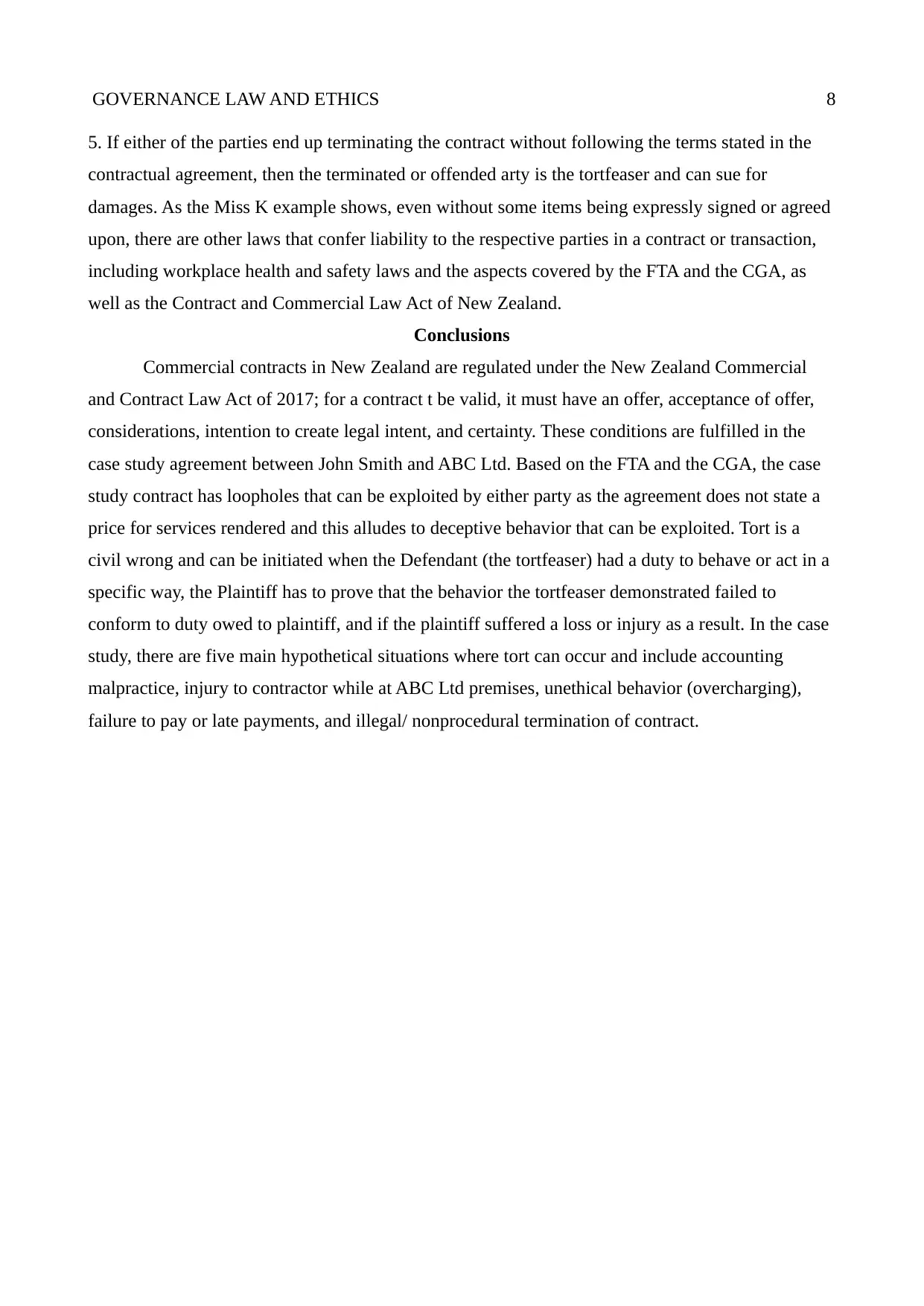
GOVERNANCE LAW AND ETHICS 8
5. If either of the parties end up terminating the contract without following the terms stated in the
contractual agreement, then the terminated or offended arty is the tortfeaser and can sue for
damages. As the Miss K example shows, even without some items being expressly signed or agreed
upon, there are other laws that confer liability to the respective parties in a contract or transaction,
including workplace health and safety laws and the aspects covered by the FTA and the CGA, as
well as the Contract and Commercial Law Act of New Zealand.
Conclusions
Commercial contracts in New Zealand are regulated under the New Zealand Commercial
and Contract Law Act of 2017; for a contract t be valid, it must have an offer, acceptance of offer,
considerations, intention to create legal intent, and certainty. These conditions are fulfilled in the
case study agreement between John Smith and ABC Ltd. Based on the FTA and the CGA, the case
study contract has loopholes that can be exploited by either party as the agreement does not state a
price for services rendered and this alludes to deceptive behavior that can be exploited. Tort is a
civil wrong and can be initiated when the Defendant (the tortfeaser) had a duty to behave or act in a
specific way, the Plaintiff has to prove that the behavior the tortfeaser demonstrated failed to
conform to duty owed to plaintiff, and if the plaintiff suffered a loss or injury as a result. In the case
study, there are five main hypothetical situations where tort can occur and include accounting
malpractice, injury to contractor while at ABC Ltd premises, unethical behavior (overcharging),
failure to pay or late payments, and illegal/ nonprocedural termination of contract.
5. If either of the parties end up terminating the contract without following the terms stated in the
contractual agreement, then the terminated or offended arty is the tortfeaser and can sue for
damages. As the Miss K example shows, even without some items being expressly signed or agreed
upon, there are other laws that confer liability to the respective parties in a contract or transaction,
including workplace health and safety laws and the aspects covered by the FTA and the CGA, as
well as the Contract and Commercial Law Act of New Zealand.
Conclusions
Commercial contracts in New Zealand are regulated under the New Zealand Commercial
and Contract Law Act of 2017; for a contract t be valid, it must have an offer, acceptance of offer,
considerations, intention to create legal intent, and certainty. These conditions are fulfilled in the
case study agreement between John Smith and ABC Ltd. Based on the FTA and the CGA, the case
study contract has loopholes that can be exploited by either party as the agreement does not state a
price for services rendered and this alludes to deceptive behavior that can be exploited. Tort is a
civil wrong and can be initiated when the Defendant (the tortfeaser) had a duty to behave or act in a
specific way, the Plaintiff has to prove that the behavior the tortfeaser demonstrated failed to
conform to duty owed to plaintiff, and if the plaintiff suffered a loss or injury as a result. In the case
study, there are five main hypothetical situations where tort can occur and include accounting
malpractice, injury to contractor while at ABC Ltd premises, unethical behavior (overcharging),
failure to pay or late payments, and illegal/ nonprocedural termination of contract.
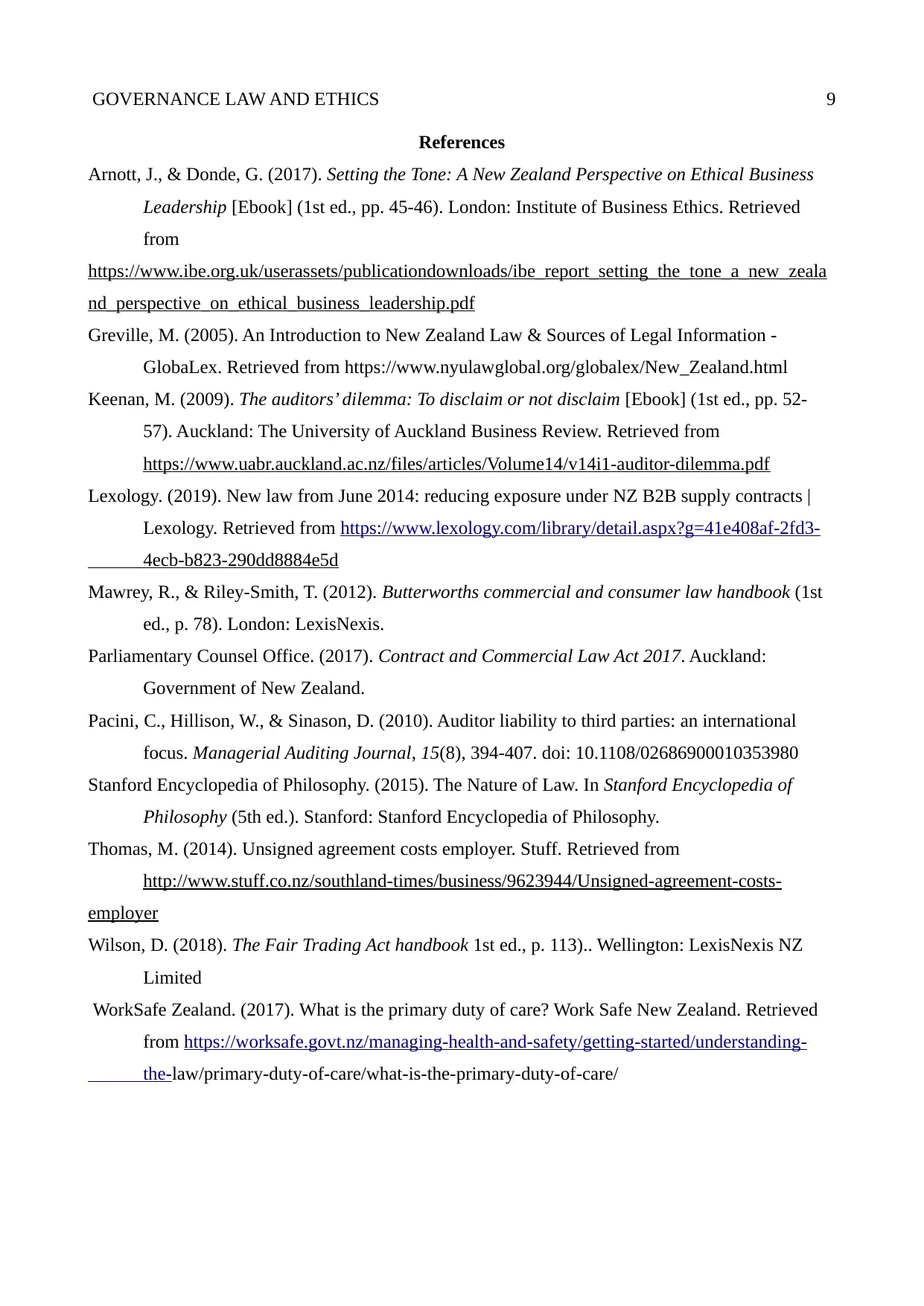
GOVERNANCE LAW AND ETHICS 9
References
Arnott, J., & Donde, G. (2017). Setting the Tone: A New Zealand Perspective on Ethical Business
Leadership [Ebook] (1st ed., pp. 45-46). London: Institute of Business Ethics. Retrieved
from
https://www.ibe.org.uk/userassets/publicationdownloads/ibe_report_setting_the_tone_a_new_zeala
nd_perspective_on_ethical_business_leadership.pdf
Greville, M. (2005). An Introduction to New Zealand Law & Sources of Legal Information -
GlobaLex. Retrieved from https://www.nyulawglobal.org/globalex/New_Zealand.html
Keenan, M. (2009). The auditors’ dilemma: To disclaim or not disclaim [Ebook] (1st ed., pp. 52-
57). Auckland: The University of Auckland Business Review. Retrieved from
https://www.uabr.auckland.ac.nz/files/articles/Volume14/v14i1-auditor-dilemma.pdf
Lexology. (2019). New law from June 2014: reducing exposure under NZ B2B supply contracts |
Lexology. Retrieved from https://www.lexology.com/library/detail.aspx?g=41e408af-2fd3-
4ecb-b823-290dd8884e5d
Mawrey, R., & Riley-Smith, T. (2012). Butterworths commercial and consumer law handbook (1st
ed., p. 78). London: LexisNexis.
Parliamentary Counsel Office. (2017). Contract and Commercial Law Act 2017. Auckland:
Government of New Zealand.
Pacini, C., Hillison, W., & Sinason, D. (2010). Auditor liability to third parties: an international
focus. Managerial Auditing Journal, 15(8), 394-407. doi: 10.1108/02686900010353980
Stanford Encyclopedia of Philosophy. (2015). The Nature of Law. In Stanford Encyclopedia of
Philosophy (5th ed.). Stanford: Stanford Encyclopedia of Philosophy.
Thomas, M. (2014). Unsigned agreement costs employer. Stuff. Retrieved from
http://www.stuff.co.nz/southland-times/business/9623944/Unsigned-agreement-costs-
employer
Wilson, D. (2018). The Fair Trading Act handbook 1st ed., p. 113).. Wellington: LexisNexis NZ
Limited
WorkSafe Zealand. (2017). What is the primary duty of care? Work Safe New Zealand. Retrieved
from https://worksafe.govt.nz/managing-health-and-safety/getting-started/understanding-
the-law/primary-duty-of-care/what-is-the-primary-duty-of-care/
References
Arnott, J., & Donde, G. (2017). Setting the Tone: A New Zealand Perspective on Ethical Business
Leadership [Ebook] (1st ed., pp. 45-46). London: Institute of Business Ethics. Retrieved
from
https://www.ibe.org.uk/userassets/publicationdownloads/ibe_report_setting_the_tone_a_new_zeala
nd_perspective_on_ethical_business_leadership.pdf
Greville, M. (2005). An Introduction to New Zealand Law & Sources of Legal Information -
GlobaLex. Retrieved from https://www.nyulawglobal.org/globalex/New_Zealand.html
Keenan, M. (2009). The auditors’ dilemma: To disclaim or not disclaim [Ebook] (1st ed., pp. 52-
57). Auckland: The University of Auckland Business Review. Retrieved from
https://www.uabr.auckland.ac.nz/files/articles/Volume14/v14i1-auditor-dilemma.pdf
Lexology. (2019). New law from June 2014: reducing exposure under NZ B2B supply contracts |
Lexology. Retrieved from https://www.lexology.com/library/detail.aspx?g=41e408af-2fd3-
4ecb-b823-290dd8884e5d
Mawrey, R., & Riley-Smith, T. (2012). Butterworths commercial and consumer law handbook (1st
ed., p. 78). London: LexisNexis.
Parliamentary Counsel Office. (2017). Contract and Commercial Law Act 2017. Auckland:
Government of New Zealand.
Pacini, C., Hillison, W., & Sinason, D. (2010). Auditor liability to third parties: an international
focus. Managerial Auditing Journal, 15(8), 394-407. doi: 10.1108/02686900010353980
Stanford Encyclopedia of Philosophy. (2015). The Nature of Law. In Stanford Encyclopedia of
Philosophy (5th ed.). Stanford: Stanford Encyclopedia of Philosophy.
Thomas, M. (2014). Unsigned agreement costs employer. Stuff. Retrieved from
http://www.stuff.co.nz/southland-times/business/9623944/Unsigned-agreement-costs-
employer
Wilson, D. (2018). The Fair Trading Act handbook 1st ed., p. 113).. Wellington: LexisNexis NZ
Limited
WorkSafe Zealand. (2017). What is the primary duty of care? Work Safe New Zealand. Retrieved
from https://worksafe.govt.nz/managing-health-and-safety/getting-started/understanding-
the-law/primary-duty-of-care/what-is-the-primary-duty-of-care/
⊘ This is a preview!⊘
Do you want full access?
Subscribe today to unlock all pages.

Trusted by 1+ million students worldwide
1 out of 9
Related Documents
Your All-in-One AI-Powered Toolkit for Academic Success.
+13062052269
info@desklib.com
Available 24*7 on WhatsApp / Email
![[object Object]](/_next/static/media/star-bottom.7253800d.svg)
Unlock your academic potential
Copyright © 2020–2026 A2Z Services. All Rights Reserved. Developed and managed by ZUCOL.





